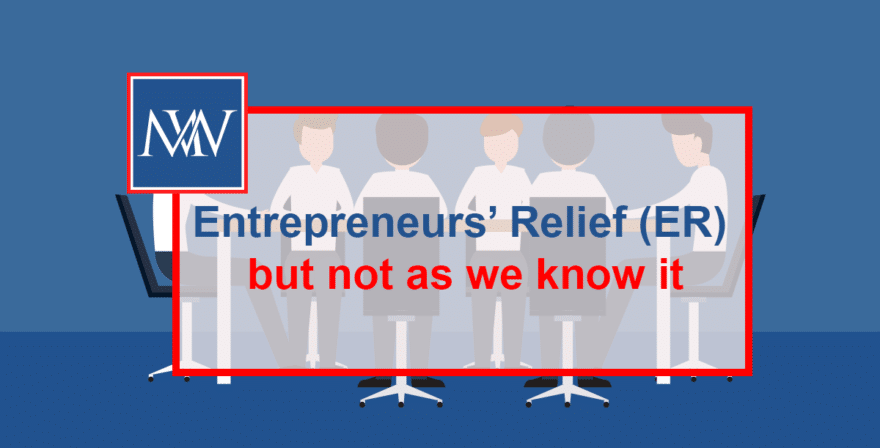
Entrepreneurs’ Relief (ER) but not as we know it
The Spring Budget 2020 announced a significant restriction on future availability of entrepreneurs’ relief (ER) for individuals who dispose of all or part of their business, individuals who dispose of shares in their personal company, and trustees who dispose of business assets.
Broadly, the lifetime limit of £10m is to be reduced to £1m for disposals on or after 11 March 2020. The measure also provides that the lifetime limit must take into account the value of entrepreneurs’ relief (ER) claimed in respect of qualifying gains in the past. The relevant legislation is included in Finance Bill 2019-21, so is currently subject to enactment.
Qualifying gains within the lifetime allowance are charged at the rate of 10%. Gains in excess of this limit are charged at the rate of 20% rate. For disposals between 6 April 2011 and 10 March 2020, the lifetime limit on gains qualifying for entrepreneurs’ relief (ER) is £10 million. The £10 million limit is a lifetime threshold and claims may be made against it on more than one occasion. Finance Bill 2019-21 also includes provisions to rename entrepreneurs’ relief (ER) as ‘business asset disposal relief’ from 2020-21 onwards.
Selling all or part of a business
To qualify for business asset disposals relief, both of the following must apply:
- the individual must be a sole trader or business partner
- the individual must have owned the business for at least two years before the date they sell it
The same conditions apply if the business is closing rather than being sold. The business assets must be disposed of within three years to qualify for relief.
Selling shares or securities
To qualify, both of the following must apply for at least two years before the shares are sold:
- the individual is an employee or office holder of the company (or one in the same group)
- the company’s main activities are in trading (rather than non-trading activities like investment) or it’s the holding company of a trading group.
There are other rules depending on whether or not the shares are from an Enterprise Management Incentive (EMI). Broadly, if the shares are from an EMI, the investor must have both:
- bought the shares after 5 April 2013
- been given the option to buy them at least one year before selling them
If the shares are not from an EMI, for at least two years before the shares are sold, the business must be a “personal company”. This means that the investor has at least 5% of both the shares and the voting rights in the company. The investor must also be entitled to at least 5% of either:
- profits that are available for distribution and assets on winding up the company
- disposal proceeds if the company is sold
If the number of shares held falls below 5% because the company has issued more shares, the investor may still be able to claim business asset disposals relief. The investor should elect to be treated as if they had sold and re-bought the shares immediately before the new shares were issued. This will create a gain on which entrepreneurs’ relief (ER) can be claimed.
The investor can also elect to postpone paying tax on that gain until they come to sell the shares. This is usually done via the self-assessment tax return. If the company stops being a trading company, entrepreneurs’ relief (ER) can still be claimed if the shares are sold within three years.
Selling assets previously lent to the business
To qualify, both of the following must apply:
- the investor sold at least 5% of their part of a business partnership or their shares in a personal company
- they owned the assets but let their business partnership or personal company use them for at least one year up to the date they sold the business or shares – or the date the business closed.
For more information on Entrepreneurs’ Relief, Book a Free Consultation
Need Accountancy Support?
For information on bespoke training, or if you have any other questions for Makesworth Accountant, please fill in your details below
















 151
151